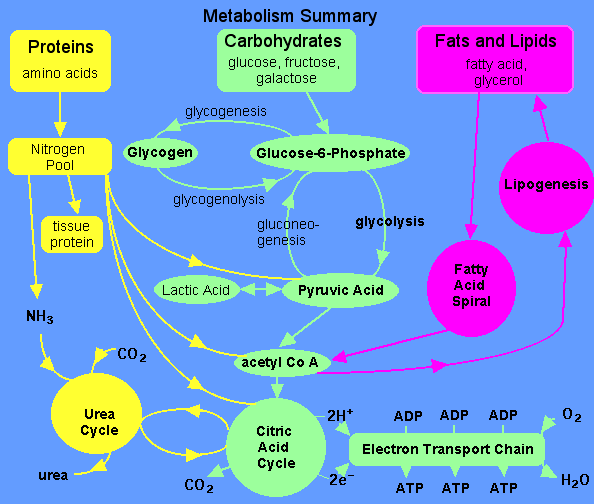
| Sluggish Metabolism | ||||||||
| Metabolism is a sum of the physical and chemical changes that take place in human organism. These changes include both synthesis (anabolism) and breakdown (catabolism) of body constituents. In a narrower sense, the physical and chemical changes that take place in a given chemical substance within an organism. It includes the uptake and distribution within the body of chemical compounds, the changes (biotransformations) undergone by such substances, and the elimination of the compounds and their metabolites. | ||||||||
| Ask Dr. Jackson How To Increase Your Metabolism | ||||||||
Figure 1. Metabolism Fat Diagram
What determines metabolic rate? A myriad of factors determine a person's rate of metabolism including: gender, age, body composition (fat vs. lean muscle mass), and level of personal activity. But the exact reason why some people have faster metabolic rates than others is still not clearly understood. Hormones play at least a partial role in determining a person's metabolic rate. In general, men have a faster metabolism than women because they have more testosterone. Likewise, the speedy metabolism of infants, growing children, and teenagers is due in part to growth hormone. Genetic factors play a role in metabolism as well. A person may be genetically predisposed to having a greater number of adipose cells, which store fat. The amount of these fat-storing cells can increase with weight gain, but they never decrease. These cells are related to the set point - the theoretical weight range in which the body tends to stay and will fight to maintain. How can you increase your metabolic rate? Eating right and exercising regularly are keys to improving your metabolism. Start with breakfast. Eating breakfast stokes your metabolism and gears your body up to burn calories all day. Don't starve yourself. Eat four to six small meals, two to three hours apart throughout the day, rather than three widely spaced big meals. Timing is essential: carbohydrates should be eaten at breakfast and post workout because of insulin's anabolic effects, but for the rest of the day control your insulin by eating only leafy green, fibrous vegetables and proteins. In order to lose fat you must burn more calories than you consume. Therefore, you must increase your workload and lower your caloric intake. To do this, Doctor Barry Sears, the creator of the Zone eating program, suggests, "to begin, lower your caloric intake by 500 calories and when you hit a plateau lower your intake again by 200 calories." Of course, you can only lower your intake so far. The last thing you want to do is restrict your calories to a point that once again your body thinks that it is starving. Another approach, according to trainer Jacob Wilson, is caloric cycling, a process that tricks the body into believing you're not dieting by fluctuating caloric intake daily.
An exercise program is crucial to losing weight. If you burn more calories than you consume, the body is forced to burn excess fat storage for energy. Aerobic exercise is the best way to increase your metabolism. Incorporate walking, swimming, cycling, or any other exercise that sustains an elevated heart rate for 30 to 40 minutes at least three times a week. Don't be lazy. Park your car further away from your destination and walk. Use the stairs instead of the elevator whenever possible. Take daily walks, especially after dinner. Do more activities around the house like vacuuming to increase your metabolic rate. To become fit and healthy with a high-speed metabolism requires changing your lifestyle. While at first these changes may seem difficult, their long-term results are definitely worth the effort. By eating the proper foods and maintaining a good exercise program you should be able to speed up your fat-burning furnace. Fat loss is sure to follow. (Author: Elizabeth Weinstock) |
||||||||
|
||||||||
|
|
||||||||


